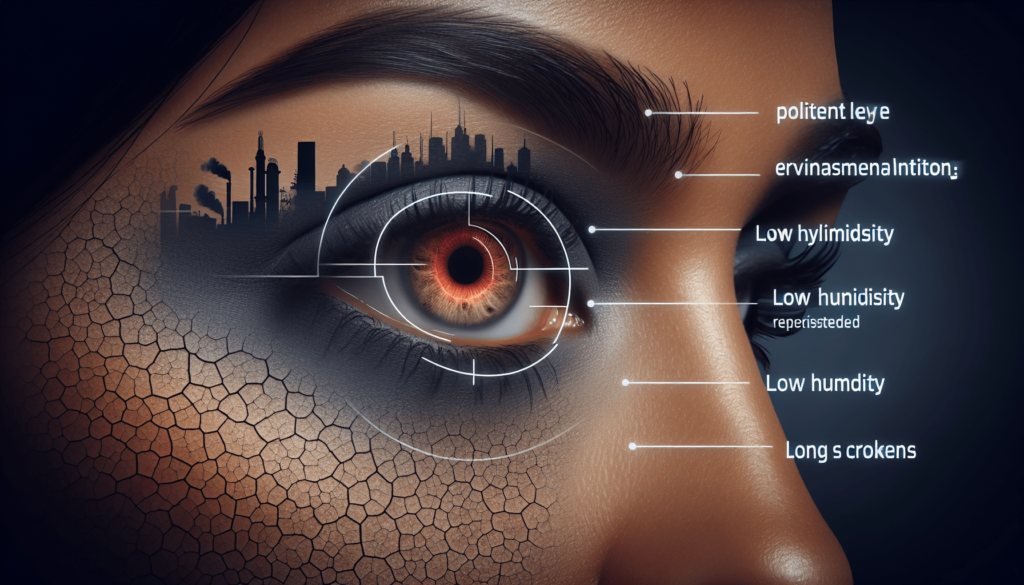Welcome to an informative article about the often-overlooked connection between chronic inflammation and dry eyes. Chronic inflammation has been found to play a significant role in causing dry eyes by affecting the production and quality of tears. By understanding the impact of inflammation on eye health, you can take steps to manage this condition and improve overall eye comfort and health.
What Role Does Chronic Inflammation Play In Causing Dry Eyes?
You may have noticed that your eyes feel dry, gritty, and irritated more often than usual. You might be wondering what’s causing this discomfort. One possible culprit is chronic inflammation. In this article, we will explore the role that chronic inflammation plays in causing dry eyes and what steps you can take to alleviate this issue.
Understanding Dry Eyes
Before we dive into the connection between chronic inflammation and dry eyes, let’s first understand what dry eyes are. Dry eye syndrome is a common condition that occurs when your tears are not able to provide adequate lubrication for your eyes. This can result in discomfort, itchiness, redness, and a feeling of something foreign in your eyes.
Symptoms of Dry Eyes
If you are experiencing dry eyes, you may notice the following symptoms:
- Itchy or scratchy eyes
- A burning sensation
- Sensitivity to light
- Blurred vision
- Eye fatigue
- Excessive tearing
Causes of Dry Eyes
Dry eyes can be caused by various factors, including:
- Aging
- Hormonal changes
- Medications
- Environmental factors
- Chronic inflammation
The Link Between Chronic Inflammation and Dry Eyes
Chronic inflammation is the body’s response to harmful stimuli, such as pathogens, irritants, or damaged cells. In the case of dry eyes, chronic inflammation in the tear glands and ocular surface can lead to a decrease in tear production and quality. This can result in a vicious cycle of inflammation and dryness, making the condition more severe over time.
How Chronic Inflammation Affects Tear Production
Chronic inflammation can disrupt the normal functioning of the tear glands, which are responsible for producing tears. When the tear glands are inflamed, they may not be able to produce enough tears, leading to dry eyes. Inflammation can also alter the composition of tears, making them less effective in providing lubrication and protection to the eyes.
The Role of Immune System in Chronic Inflammation
The immune system plays a key role in chronic inflammation. In response to stimuli, the immune system releases pro-inflammatory cytokines that attract inflammatory cells to the affected area. In the case of dry eyes, this inflammatory response can damage the tear glands and ocular surface, exacerbating the symptoms of dryness.
Treatment Options for Chronic Inflammation-Induced Dry Eyes
If you suspect that chronic inflammation is causing your dry eyes, there are several treatment options available to help alleviate your symptoms. It is essential to consult with an eye care professional to determine the underlying cause of your dry eyes and develop a personalized treatment plan.
Artificial Tears
Artificial tears are lubricating eye drops that can help relieve dryness and irritation associated with chronic inflammation-induced dry eyes. These drops can provide temporary relief by supplementing the natural tears and maintaining moisture on the ocular surface.
Anti-Inflammatory Medications
In some cases, anti-inflammatory medications such as corticosteroids or cyclosporine eye drops may be prescribed to reduce inflammation in the tear glands and ocular surface. These medications can help control chronic inflammation and improve tear production and quality.
Warm Compresses
Applying warm compresses to your eyes can help soothe inflammation, unclog blocked tear glands, and improve the flow of tears. You can use a warm washcloth or a special compress designed for dry eyes to provide relief and reduce dryness.
Nutritional Supplements
Certain nutrients, such as omega-3 fatty acids and vitamin A, play a crucial role in maintaining eye health and reducing inflammation. Taking nutritional supplements or incorporating foods rich in these nutrients into your diet can help support tear production and alleviate dry eyes.
Lifestyle Modifications
Making lifestyle modifications can also help manage chronic inflammation-induced dry eyes. Simple changes like using a humidifier, avoiding exposure to irritants, taking breaks from digital screens, and staying hydrated can improve your eye comfort and reduce inflammation.
Preventing Chronic Inflammation-Induced Dry Eyes
While treating chronic inflammation-induced dry eyes is essential, taking steps to prevent the condition from worsening is equally crucial. By making healthy lifestyle choices and protecting your eyes from irritants and inflammation triggers, you can reduce the risk of developing dry eyes or experiencing severe symptoms.
Protecting Your Eyes from Dryness
To prevent chronic inflammation-induced dry eyes, consider the following tips:
- Maintain good eye hygiene
- Avoid exposure to smoke, allergens, and pollutants
- Use protective eyewear in windy or sunny conditions
- Blink regularly to spread tears evenly across the ocular surface
Managing Inflammation Triggers
Identifying and managing inflammation triggers can help prevent chronic inflammation-induced dry eyes. Keep track of activities or substances that worsen your symptoms and take steps to avoid or minimize exposure to these triggers.
Regular Eye Exams
Regular eye exams are essential for detecting and addressing any underlying issues that may contribute to chronic inflammation-induced dry eyes. Your eye care professional can evaluate your eye health, assess tear production, and recommend appropriate treatments to manage your symptoms effectively.
Conclusion
Chronic inflammation plays a significant role in causing dry eyes by disrupting tear production and quality. By understanding the link between chronic inflammation and dry eyes, you can take proactive steps to manage inflammation, alleviate your symptoms, and prevent the condition from worsening. Consult with an eye care professional to develop a personalized treatment plan tailored to your needs and improve your eye comfort and health.


